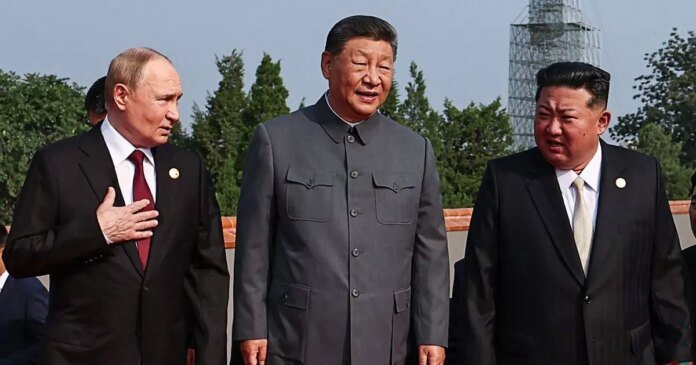China’s recent military parade showcased more than just a tribute to its wartime contributions. The event featured precise marching formations, advanced weaponry like missiles and newly revealed armored vehicles, serving as a grand demonstration of strength.
The parade also symbolized unity among authoritarian leaders such as North Korea’s Kim Jong-un and Russia’s Vladimir Putin. It was a clear message aimed at challenging the United States and Western powers, particularly in response to the economic pressure led by former President Donald Trump.
During the event, Putin warmly referred to Xi as a “dear friend,” highlighting the strong strategic ties between China and Russia. This diplomatic gesture was a deliberate move to assert dominance over the US and boost the standing of China, Russia, and their allies.
The gathering of Xi, Putin, and Kim watching the ceremony marked a significant moment in their growing alliance, signaling China’s push for leadership in the regional military and economic sphere. The trio’s visible camaraderie subtly undermined the US and Trump, exacerbating tensions following the recent Putin-Trump meeting in Alaska.
Trump, feeling sidelined, criticized the leaders’ actions, emphasizing the sacrifices made by Americans in China’s history. The meeting was viewed by experts as a strategic move by China, Russia, and North Korea to expand their influence and military capabilities, potentially reshaping global power dynamics.
In his address, Xi emphasized the importance of peace and dialogue, positioning China as a formidable force that stands up to bullying tactics. The historical ties between China and the US, dating back to WWII, were subtly invoked, hinting at China’s determination not to retreat in the face of international pressure.
While Kim Jong-un’s presence added a layer of intrigue, the focus remained on Putin’s strategic maneuvers, leveraging partnerships with China for economic and military gains. This event bolstered Putin’s image as a global player, despite ongoing challenges in Ukraine and his country’s fragile economy.
The event also served as a platform for Putin to glorify Russia’s WWII efforts while justifying his actions against Ukraine. Simultaneously, China’s growing assertiveness, particularly regarding Taiwan, hinted at its ambitions to challenge the US in the near future.
Xi’s call for peace amid warnings of potential conflict underscored China’s aspiration to rival the US both militarily and economically, setting the stage for a dynamic power struggle in the coming years.
